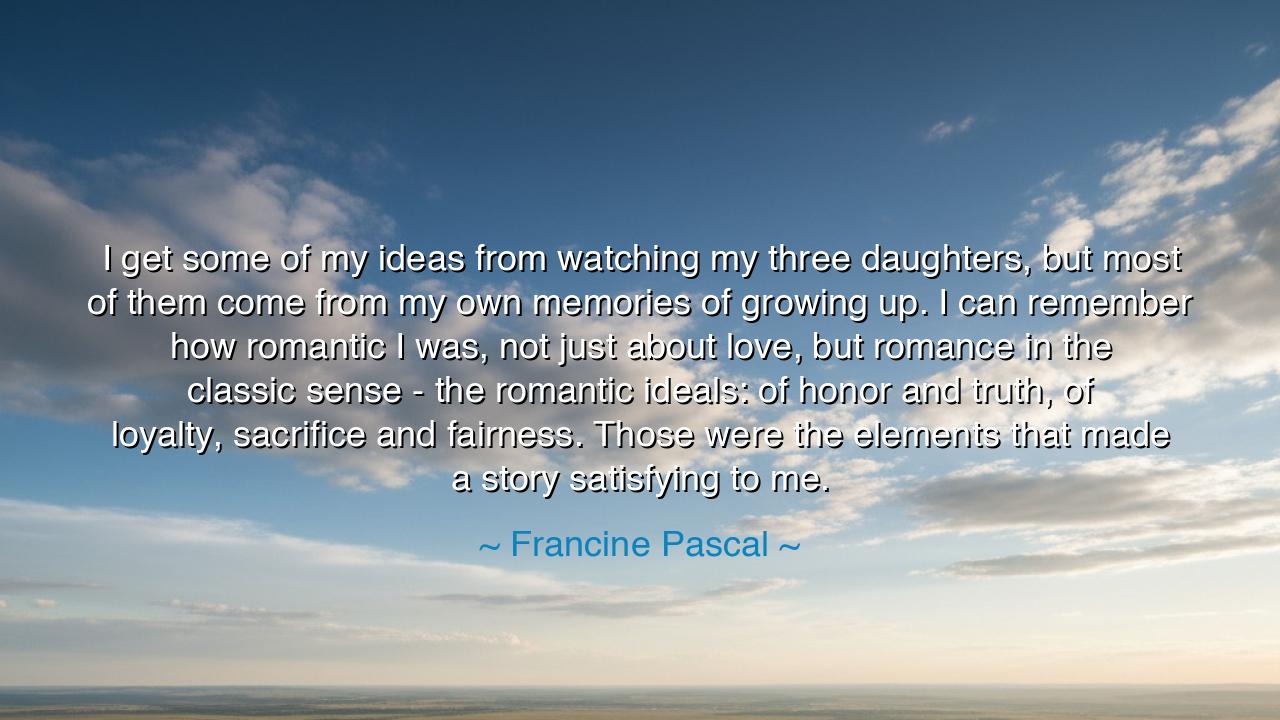
I get some of my ideas from watching my three daughters, but most
I get some of my ideas from watching my three daughters, but most of them come from my own memories of growing up. I can remember how romantic I was, not just about love, but romance in the classic sense - the romantic ideals: of honor and truth, of loyalty, sacrifice and fairness. Those were the elements that made a story satisfying to me.






In the words of Francine Pascal, "I get some of my ideas from watching my three daughters, but most of them come from my own memories of growing up. I can remember how romantic I was, not just about love, but romance in the classic sense—the romantic ideals: of honor and truth, of loyalty, sacrifice, and fairness. Those were the elements that made a story satisfying to me," we find an exploration of the enduring nature of romanticism, a deep, almost heroic connection to the values that shape not only the world of storytelling, but the very foundation of human integrity. Pascal’s reflection reaches into the heart of romance, not just as an emotion or a fleeting ideal, but as a life philosophy—one that places emphasis on values that transcend mere personal affection and reach into the very core of what it means to live honorably, to live for something greater than oneself.
The ancients understood these principles well, recognizing that romance was not merely a fleeting feeling but a binding set of values that governed the way a person interacted with the world. Homer’s Iliad, for example, centers around the concept of honor, especially through the character of Achilles. Achilles, the great hero of Greek mythology, is driven not by mere desire or love, but by a sacred loyalty to his comrades and his sense of duty. His wrath is not simply a personal vendetta, but a grief over the dishonor he feels after his honor is slighted by King Agamemnon. In this sense, Achilles embodies the romantic ideal of sacrifice and loyalty, values that would resonate deeply with Pascal’s own understanding of what makes a story satisfying—a tale that is grounded in profound moral principles.
The Romans too celebrated these ideals, particularly through their heroes like Cincinnatus and Aeneas. Cincinnatus, a farmer turned general, left his plow to become a military leader, and after securing victory for Rome, he willingly returned to his farm, placing the needs of the republic above personal gain. This act of sacrifice and duty epitomizes the romantic ideal of placing honor above all else. Similarly, Aeneas in Virgil’s Aeneid represents sacrifice and loyalty to the gods and his people, enduring hardship and personal loss to fulfill his destiny. Both of these figures mirror the romantic ideals Pascal cherishes—loyalty, sacrifice, and honor—which transcend personal satisfaction and connect deeply to the broader good of the community and the world.
In the medieval period, these same values of romanticism were embodied by knights and warriors who followed a strict code of conduct known as chivalry. The tales of King Arthur and the Knights of the Round Table center around honor, truth, and fairness. The knights were expected to be brave, loyal, and sacrificial, defending the helpless and fighting for a cause greater than themselves. These romantic ideals were central to the Arthurian legends, where each knight’s quest was not only a pursuit of personal glory but a service to the greater good. Pascal’s remembrance of her own romanticism echoes the deep, almost noble pursuit of these ideals, a desire to weave moral excellence into the very fabric of one’s life and actions.
Much like the romantic ideals in ancient and medieval tales, Pascal's reflection calls attention to the timeless relevance of these values. In modern times, the idea of romanticism often centers on personal love and individual relationships, but Pascal reminds us that these ideals—honor, truth, loyalty, and sacrifice—are the foundations upon which meaningful connections are built. True romance, she suggests, transcends the fleeting nature of personal affection. It is about the deep moral fabric that binds individuals to each other, as well as to the world. Her words suggest that romantic love is a reflection of something greater—a shared ideal that both informs and shapes the human experience.
In modern storytelling, these ideals are often cast aside in favor of lighter, more superficial narratives, but Pascal's commitment to these foundational truths provides a powerful antidote. She calls for a return to the deep truths that once gave stories a lasting impact—stories where characters are tested by their honor, where sacrifice is made for the greater good, and where loyalty is a matter of life and death. These are not simply the values of a bygone age, but values that continue to resonate deeply with our own humanity. Whether in the struggles of ancient heroes or the challenges faced in modern life, these romantic ideals serve as both a compass and a moral guide.
The lesson that Pascal’s quote offers is one of commitment to values that transcend fleeting emotion. It is a reminder that true romance is not just about love between two individuals, but about the larger ideals that bind us together. In your own life, reflect on the importance of honor, truth, loyalty, and sacrifice in your relationships and endeavors. Recognize that the most satisfying and meaningful experiences are those that involve growth, moral commitment, and a dedication to causes greater than oneself. Just as the heroes of old shaped their worlds with their romantic ideals, so too can you forge a life of purpose and meaning by adhering to the core values that define true romance.






AAdministratorAdministrator
Welcome, honored guests. Please leave a comment, we will respond soon